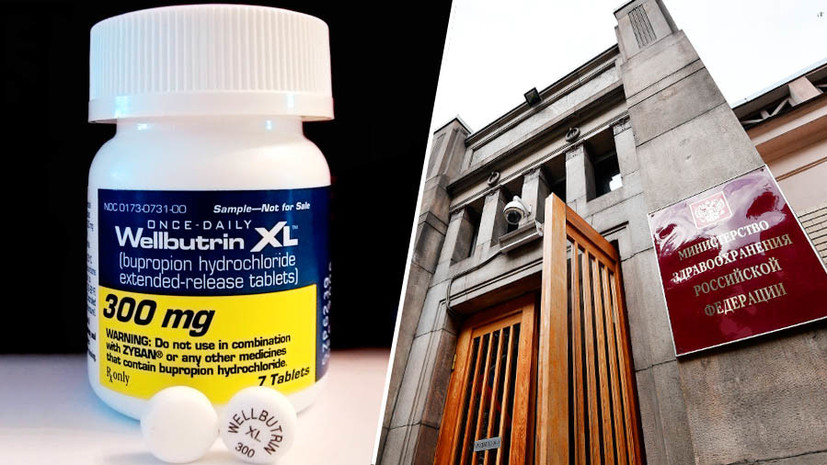The antidepressant bupropion, which was used to treat mental disorders, unexpectedly turned out to be illegal in the spring of 2019, when law enforcement agencies opened several criminal cases at once because of the purchase of a medicine. As the security officials themselves explained, examinations showed that bupropion is a derivative of the forbidden ephedron - it has formal similarities in the chemical formula. As a result, for those who ordered pills in foreign pharmacies, law enforcement officers imputed drug smuggling (229.1 of the Criminal Code of the Russian Federation), and in the case of acquisition through intermediaries in Russia, they brought in under the article on drug trafficking (228 of the Criminal Code of the Russian Federation).
As RT reported, after a request by State Duma deputy Yaroslav Nilov to the Ministry of Health on the topic of criminal prosecution of citizens for the purchase of this antidepressant, the department turned to leading experts with questions about the drug potential of the antidepressant and the effectiveness of its use for medical purposes.
So, the agency’s representatives sent letters to three experts: the chief freelance psychiatrist specialist of the Ministry of Health of Russia Zurab Kekelidze, the director of the Moscow Scientific and Practical Center for Narcology of the Moscow Department of Health Sergey Koporov and the main freelance specialist for analytical and forensic toxicology of the Ministry of Health Boris Izotov.
RT became known results of expert evaluations of bupropion.
Unpopular, but without side effects
In a response to the Ministry of Health’s request to RT about the results of consultations with experts, it was stated that the drug bupropion, known under the trade names Velbutrin, Zyban, Voksra, Budeprion, Aplenzin, is an atypical antidepressant used in medical practice in Europe and the United States since the 1980s in the treatment of anxiety and social phobia accompanying depression, attention deficit disorder, and seasonal affective disorders.
Zurab Kekelidze, the chief freelance specialist psychiatrist at the Ministry of Health, notes that bupropion, previously officially sold in Russia, has not been widely used, but does not cause side effects characteristic of similar antidepressants.
“In addition, bupropion has proven effective in treating nicotine addiction,” the expert said.
Addiction potential
According to Kekelidze, bupropion can be used to obtain a psychoactive effect.
“In this case, the route of administration changes from oral to intranasal, and dosages are many times higher than therapeutic, which leads to an increased risk of seizures, since the use of bupropion can lower the threshold for convulsive readiness of the brain,” the expert writes.
However, apparently, the use of the drug is not for medical purposes, exists only in theory.
“According to the Moscow Scientific and Practical Center for Narcology of the Moscow Department of Health, over the past ten years, there have been no cases of abuse of bupropion in the narcological service of the constituent entities of the Russian Federation. In addition, during chemical-toxicological studies in samples of bio-liquids of examined citizens, no cases of bupropion were detected, ”the director of the institution, Sergey Koporov, said in a statement.
As for the practical possibility of turning bupropion into a banned ephedron, then, according to experts, this is possible, but extremely difficult.
“Obtaining ephedron in this way requires deep knowledge of organic chemistry and the appropriate qualifications, therefore, most often, ephedron is obtained from ephedrine,” explains Boris Izotov, chief freelance specialist in analytical and forensic toxicology at the Ministry of Health.
To the RT’s question about whether the Ministry of Health would take any actions to “legalize” bupropion taking into account the opinions of experts, the department did not answer.
The Belyaev Case
One of the first cases of persecution of Russians for the purchase of bupropion became known in April 2019. Then the Ministry of Internal Affairs opened a criminal case against a resident of Yekaterinburg, Daria Belyaeva, suffering from schizotypal personality disorder.
Belyaeva became a defendant in a criminal case under part 3 of article 229.1 of the Criminal Code after she ordered in Poland the antidepressant Elontril recommended by her doctor, which includes bupropion. There was no drug in the lists of substances prohibited for import, but during the examination it was found that drugs could theoretically be made from tablets. The forensic expert service of the customs administration concluded that the product can be considered as a derivative of ephedron.
Now the girl faces up to 20 years in prison for acquiring 30 tablets.
The media reported a number of similar criminal cases being investigated in several regions.

